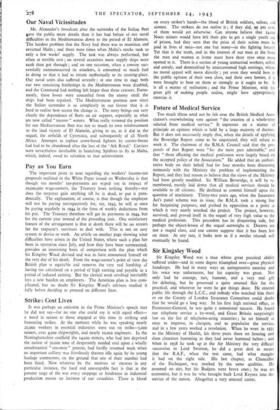Future of Medical Service
Too much alarm need not be felt over the British Medical Asso- ciation's overwhelming vote against " the creation of a whole-time salaried State medical service." It expresses on a matter of principle an opinion which is held by a large majority of doctors. But it does not necessarily imply that, when the details of applying the Beveridge Report come to be negotiated, they will refuse to work it. The chairman of the B.M.A. Council said that the pro- posals of that Report were "for the most part admirable," and that " those affecting the medical profession were largely based on the accepted policy of the Association." He added that an authori- tative body on their behalf had for four months been discussing intimately with the Ministry the problem of implementing the Report, and they had reason to believe that the views of the Ministry had been greatly modified. Sir William Beveridge, it will be re- membered, merely laid down that all medical service's should be available to all citizens. He declined to commit himself upon the question of machinery. Thirty-two years ago, when the Insurance Act's panel scheme was in issue, the B.M.A. took a strong line for bargaining purposes, and pushed its opposition to a point at which it very nearly wrecked the project. The project, however, survived, and proved itself in the sequel of very high value to the medical profession. This precedent has its disquieting side, but perhaps the object-lesson of the sequel outweighs it. Doctors are not a stupid class, and one cannot suppose that it has been lost on them. At any rate, it looks now as if a modus vivendi will eventually be found.


























 Previous page
Previous page